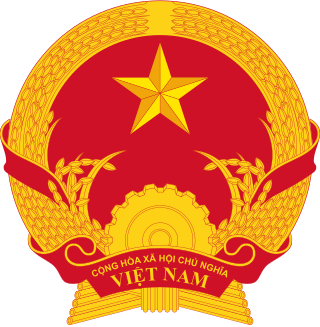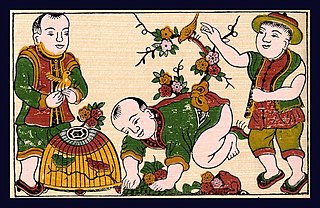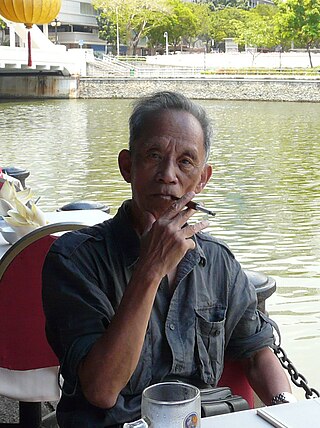
The Government of the Socialist Republic of Vietnam is the cabinet and the central executive body of the state administration of Vietnam. The members of the Government are appointed by the President of Vietnam on the advice of the Prime Minister of Vietnam and approved by the National Assembly. The Government is led by the Communist Party of Vietnam (CPV), which is headed by the CPV general secretary, often seen as the highest political post in Vietnam.
The Sán Dìu are a Yao ethnic group in northern Vietnam who speak Yue Chinese (Cantonese), a Sinitic language. They are believed to have migrated from Guangdong, China around 1600.

The Thổ ethnic group inhabits the mountainous regions of northern Vietnam, mainly Nghệ An Province southwest of Hanoi. Many Thổ speak the Tho language, which is closely related to Vietnamese. The Thổ population numbered 91,430 in 2019.

Duy Tân University is a private research university in Da Nang, Vietnam. The name derives from the Modernisation Movement, or phong trào Duy Tân, of 1906–1908. In 2019, the school was awarded the "First Class Labor Medal".

Vè or Đồng dao is a poetic and song form for children, most typical of Vietnam.

Nguồn is a Vietic language spoken by the Nguồn people in the Trường Sơn mountains in Vietnam's North Central Coast region as well as in nearby regions of Laos.
Bruu is a Mon–Khmer dialect continuum spoken by the Bru people of mainland Southeast Asia. Sô and Khua are dialects.

Đặng Phong (1937–2010) was a Vietnamese economic historian.
The following is a list of political organizations and armed forces in Vietnam, since 1912:

The 11th Central Committee of the Communist Party of Vietnam was elected at the 11th National Congress of the Communist Party of Vietnam. The 11th Central Committee elected the 11th Politburo and the 11th Secretariat.
Nguyễn Thị Định was a wife of the Vietnamese emperor Thành Thái, and the queen mother of the emperor's fifth son, the boy emperor Duy Tân. Following the abdication, forced by the French, of Thành Thái, the new boy emperor's mother resided at court as queen mother, while Thành Thái was relegated to a duke, and lived with his large retinue of wives and retainers away from court. This did not prevent the former emperor for pressuring his wife, the queen mother, for funds. She, with her husband and son, are buried in the tomb of Dục Đức.

On 27 January 2016, the 12th National Congress elected 180 individuals to serve as members of the 12th Central Committee of the Communist Party of Vietnam (CPV) for the electoral term 2016–2021. The Central Committee is the highest decision-making institution in the CPV and Vietnam when the Party's National Congress and the Politburo are adjourned. In between congresses, the Central Committee is responsible for organising and directing the implementation of the Party's Political Platform, Charter, and resolutions adopted at the National Congress. Furthermore, it adopts guidelines and policies in all relevant fields, domestic or foreign. In addition, the sitting Central Committee is responsible for convening the next National Congress. Members of the Central Committee have the right to elect and remove the General Secretary of the Central Committee as well as members of the Politburo, the Secretariat and the Central Inspection Commission (CIC). When the Central Committee is not in session, it delegates its powers to these three elected organs which then report on their activities the next time the Central Committee convenes for a meeting. Central Committee members are responsible to and report on their work to the Central Committee.
Lý Thị Ngọc Kiều, dharma name Diệu Nhân (妙因), was a princess during the Lý dynasty in Vietnamese history. She was the 17th leader of the Vietnamese Vinītaruci school of Buddhism.

The 10th Central Committee of the Communist Party of Vietnam was elected at the 10th National Congress of the Communist Party of Vietnam. The 10th Central Committee elected the 10th Politburo and the 10th Secretariat.
Nguyễn Văn Lợi was a Vietnamese linguist who served as the deputy director of the Institute of Linguistics at the Vietnam Academy of Social Sciences.

The government of the Nguyễn dynasty, officially the Southern dynasty and commonly referred to as the Huế Court, centred around the emperor as the absolute monarch, surrounded by various imperial agencies and ministries which stayed under the emperor's presidency. Following the signing of the Patenôtre Treaty the French took over a lot of control and while the government of the Nguyễn dynasty still nominally ruled the French protectorates of Annam and Tonkin, in reality the French maintained control over these territories and the Nguyễn government became subsidiary to the administration of French Indochina. During World War II the Japanese launched a coup d'état ousting the French and establishing the Empire of Vietnam which was ruled by the Nguyễn government. During the August Revolution the Nguyễn government was abolished in the aftermath of World War II.
The Tale of Từ Thức Marrying a Goddess or Từ Thức Meeting Gods is a Vietnamese legend told in Truyền kỳ mạn lục by Nguyễn Dữ in the 16th century and based on the Folktale of Từ Thức Cave. It follows the life of Từ Thức in the Trần dynasty who meets and marries a goddess in the godly realm before leaving his wife to revisit his hometown, unaware that countless ages have passed in the mortal world since then.

The 13th Central Committee of the Communist Party of Vietnam (CPV) has been in session since the conclusion of the 13th National Congress in 2021. It elected, at its 1st Plenary Session, the Politburo, about half of the membership of the Secretariat and the Central Inspection Commission of the 13th term.

Đào Thái Hanh, courtesy name Gia Hội (嘉會), art name Sa Giang (沙江) and Mộng Châu (夢珠), was a Vietnamese mandarin of the Nguyễn dynasty. As one of the earliest collaborators of Bulletin des Amis du Vieux Hué since its establishment in 1914, his articles for the magazine have left many valuable studies on the history and culture of Huế.

On 27 January 2016, the 12th National Congress elected 20 people to serve as alternates of the 12th Central Committee of the Communist Party of Vietnam (CPV) for the electoral term 2016–2021. The Central Committee is the highest decision-making institution in the CPV and Vietnam when the Party's National Congress and the Politburo are adjourned. In between two congresses, the Central Committee is responsible for organising and directing the implementation of the Party's Political Platform, Charter and resolutions adopted at the National Congress. It decides on guidelines and policies in all relevant fields, domestic or foreign. The sitting Central Committee is responsible for convening the next National Congress. Alternates are party cadres who have the right to speak and attend meetings of the Central Committee but do not have the right to vote. They are 45 years of age or younger and undergo long-term political education to prepare them for future assignments and election as a member of the Central Committee. Candidates for alternates need to meet the same standards as Central Committee members. Work assignments of alternates are decided upon by the Politburo. Lastly, alternates are responsible to and report on their work to the Central Committee.









